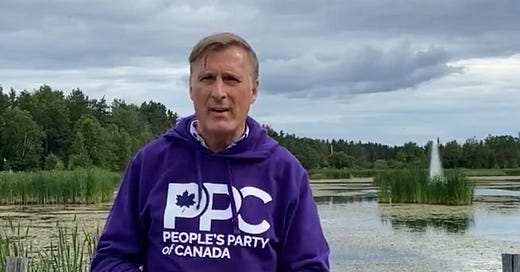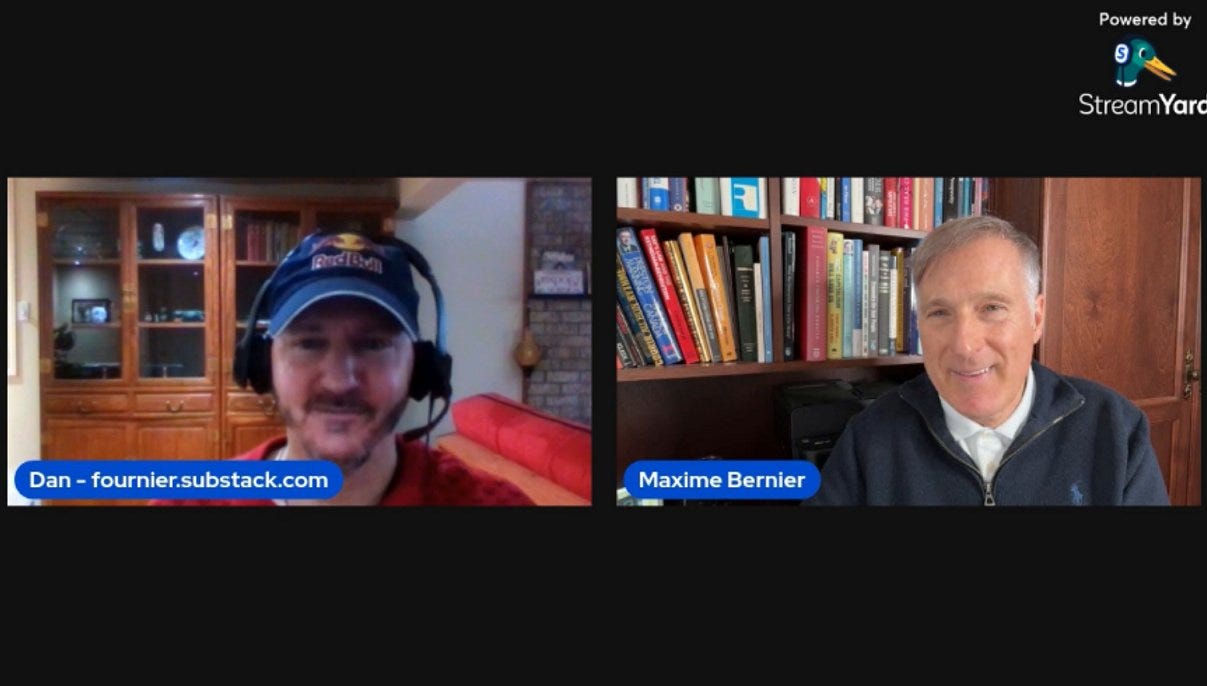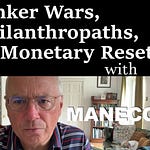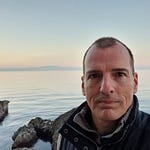Welcome to the fifth episode of Dan Fournier’s Down the Rabbit Hole podcast.
Guest: Maxime Bernier, leader of the People’s Party of Canada
Screenshot image of Maxime Bernier taken from an August 1st, 2021 tweet.
In this exclusive interview, the founder and current leader of the People’s Party of Canada (PPC), Maxime Bernier, shares his insights on a variety of issues Canadians and others from around the world are concerned about.
Who is Maxime Bernier?
According to his Wikipedia page and his own website, here are some facts about the outspoken leader of the PPC:
Maxime Bernier was born January 18, 1963, in St-Georges-de-Beauce. He is the father of two girls.
In 1985, Mr. Bernier earned a Bachelor of Commerce degree from the Université du Québec à Montréal and entered Law at the University of Ottawa. He was called to the Quebec Bar in 1990.
He was the Member of Parliament (MP) for Beauce from 2006 to 2019 and served as a Cabinet minister in the Harper government.
He also served as Minister of industry from February 6, 2006 until August 13, 2007 before being promoted to Minister of Foreign Affairs from August 14, 2007 to May 26, 2008.
A tough and determined competitor, he once ran 106 km across his constituency, completing the run in 13 hours and raising $165,000 for the Beauce food bank.
On August 23, 2018, he left the Conservative Party of Canada to sit as an independent MP and announced the launch of a new party – the People’s Party of Canada (PPC).
On August 31, 2018, Bernier published an op-ed in the National Post: Maxime Bernier: Why my new political movement? Because Canada has been hijacked.
His belief in personal responsibility and freedom is at the heart of his political vision.
Join us for this open and enlightening talk which few politicians dare to undertake.
Note that the first half of the interview was conducted in English and the second in French. Translations into English for the French portion are provided further below in this post.
ALTERNATE PODCAST LINK: listen on Spreaker or download the .mp3 for later listening.
Show Time Stamps
[00:00 to 00:55] Podcast intro
[00:56 to 04:57] Who is Maxime Bernier, the man?
[05:02 to 11:37] His take on the Tucker Carlson-Vladimir Putin interview and the mainstream media’s response to it.
[11:38 to 16:06] I ask Bernier if he thinks that the Canadian mainstream media has been infiltrated and whether or not they are serving the interests of Canadians. We also talk about propaganda and compare the news media from China and Russia with that of Canada.
[16:12 to 22:45] Bernier shares his thoughts on the trans agenda in Canada, including matters such as gender ideology, transitioning processes such as using hormone blockers and even surgeries for minors, as well as trans athletes. Bernier weighs in on the recent comments made by Danielle Smith, the Premier of Alberta, and Pierre Poilievre, the current leader of the Conservative Party of Canada regarding these issues.
FRENCH PORTION OF THE INTERVIEW (translated below):
[23:00 to 34:01] I ask Maxime Bernier to comment on the recently submitted Bill 50 in Quebec for which I wrote an article titled Climate Lockdowns coming to Quebec? Bill 50 suggests so. I start by enumerating some major concerns of the bill as they pertain to things that could arise under a declared state of emergency such as the confinement of individuals, forced closures of businesses, the closure of roads and highways, and the cutting off of water and energy supplies – all for a period which could extend to 30 days. We also examine how the World Health Organization (WHO) and its International Health Regulations (IHRs) are currently being re-negotiated with governments from around the world that could eventually lead to more lockdowns – including those that could be initiated on the pretext of climate change crises.
[34:03 to 40:41] Here I ask Maxime to comment on some key concerns regarding geoengineering and weather modification taking place in the province of Quebec and across Canada. To help mitigate this colossal problem, he calls for an increase in transparency from the government (and its agencies), and also suggests that a Parliamentary Inquiry (or Parliamentary Commission) could be undertaken for this matter.
[40:42 to 45:17] Here, I ask Maxime if he is aware of a current hearing that is before the Court of Appeal of Quebec regarding the public health law in the province which is undertaken by former lawyer, Gloriane Blais, who was disbarred from the Quebec Bar Association for speaking out about Covid-19 vaccines.
[45:19 to 47:49] Here, I ask Maxime about his thoughts on Steven Guilbeault, the current federal Minister of Environment and Climate Change Canada and his unswerving climate alarmist diktats and policies.
[47:52 to 50:44] I then ask him about the upcoming projects planned for his party, the PPC.
[50:49 to 51:33] With this last question, I ask Maxime about his plans for today (Valentine’s Day). Note: a video clip has been prepared for this segment.
[51:34 to 53:42] Where people can find Maxime Bernier online and learn more about the People’s Party of Canada.
[54:01 to 56:39] Outro (song) - White Rabbit by Grace Slick of Jefferson Airplane.
Show Notes
The Tucker Carlson-Vladimir Interview
The interview was posted on February 8, 2024 on Tucker Carlson’s Twitter/X page and also his YouTube channel.
The Russia-Ukraine War
During our talk, I mentioned two of my publications on my Substack.
The first, which is my most viewed of all my articles with over 11,000 views, is Ten Inconvenient Truths about Ukraine largely ignored by the MSM from January 13, 2023.
And the second (which I did not mention by name) was Canada pledges unlimited funds to Ukraine despite endemic corruption from January 25, 2023.
Note that I have also published other articles on the Ukraine:
Canada’s dangerous escalation in the Russia-Ukraine War is based on lies and deception, Feb. 9, 2023
Zelenskyy Publicly Endorses Neo-Nazi troops into his Forces, March 2, 2023
Ukraine is Finished, - U.S. Col. Douglas MacGregor, March 4, 2023
During our exchange, I mentioned that Canada had even trained Neo-Nazi troops in the Ukraine. And even upon a media inquiry to the Canadian Armed Forces for comment, they stated that “Ukraine is a sovereign country and was thus responsible for recruiting and vetting its own security forces.”
Canada has already committed over $6 billion in funds and military equipment to the Ukrainians in this war.
The Trans Agenda in Canada
My question related to this issue was principally about the public comments made by Danielle Smith, the Premier of Alberta and Pierre Poilievre, the leader of the opposition (Conservative) party. Click the hyperlinks to hear what these politicians said on the matter.
The WHO & International Health Regulations (IHRs)
I also mentioned during our interview that the World Health Organization (WHO) has something called the International Health Regulations, or IHRs that are currently being revised and negotiated between the WHO and countries around the world.
These revisions are supposed to be adopted this Spring (in May), even though it appears that it is unlikely due to a number of facts.
I mentioned that I had made an Access to Information request nearly 4 months ago about these IHRs to Health Canada, but after a lot of back and forth, i.e., email exchanges, they have yet to provide answers to my inquiry.
Nonetheless, citizens can learn more about the IHRs using the following links:
Public Health Agency of Canada – Emergency preparedness and response – Canada's International Health Regulations: National IHR Focal Point
Canada is a signatory to the IHR: "In 2005, the Public Health Agency of Canada (PHAC) was designated as the NFP for Canada."
"PHAC is also responsible for coordinating the implementation of the IHR on behalf of the Government of Canada."
"As part of the implementation of the International Health Regulations (IHR), each country (State Party) is required "to designate or establish a National IHR Focal Point (NFP) and the authorities responsible within its respective jurisdiction for the implementation of health measures under these Regulations" (IHR Article 4)."
Public Health Agency of Canada – Emergency preparedness and response – Canada and the International Health Regulations (IHR): Overview
How Canada meets its obligations under the IHR
Implementation: Canada implements the IHR under existing legislation, regulations, policies and agreements in place at both the federal and provincial/territorial levels.
Provinces: “Collaboration efforts between federal departments and with provincial and territorial partners improve and strengthen our country's public health preparedness and response system.
"Because legislation differs among federal and provincial/territorial governments, Canada has mechanisms, agreements and plans in place that enable national coordination. This is particularly important during public health emergencies that require federal involvement."
In its current form (unless revisions have been made to the contrary), the responsibility for determining if an event is a public health emergency of international concern lies with the WHO's Director-General.
James Roguski has written extensively on the WHO and the IHRs on his substack and has granted many interviews on the subject. His post TAKE ACTION CANADA has information specifically to Canada, including an official House of Commons petition (e-4623 (Foreign affairs)) to this effect.
Geoengineering & Weather Modification in Quebec and the rest of Canada
During this part of the interview, I mentioned a large (nearly 250-page) series that I had written and posted. Here are the first three parts:
Special Investigation: Geoengineering & Weather Modification in Canada, Part 1
Special Investigation: Geoengineering & Weather Modification in Canada, Part 2
I am currently working on Part 4 of this series which I hope to be able to publish by the end of this month.
The current hearing before the Court of Appeal of Quebec related to the public health law
During our talk, I asked Maxime Bernier a question related to a hearing initiated by Gloriane Blais that is presently before the Court of Appeal in Quebec .
Two weeks ago, I interviewed Gloriane Blais, a lawyer in Quebec who was disbarred for speaking out about the Covid-19 mRNA vaccines.
You can learn more about Gloriane Blais by listening to that podcast and also via her page on Twitter/X. Her hearing at Court of Appeal in Quebec is not completely over, but is seeing some level of success.
Addendum (2024-02-16) - About Vaccination:
During the interview, I mentioned that according to the way the current law is coded, the Quebec government could force-vaccinate people in the event of a public health emergency.
Here is the provision of the Quebec Health Law (Quebec Public Health Act) to this effect (under the section DIVISION III - PUBLIC HEALTH EMERGENCY, clause 123) with emphasis added (red underlining):
As we eluded to in our talk, this (and other parts of the Public Health Act) is in clear contravention of the Canadian Constitution, the Quebec Charter, and the Canadian Charter of Rights and Freedoms.
In addition, vaccination is not mandatory in Canada nor in the province of Quebec; here are some links and resources to this effect.
ENGLISH:
Immunisation Canada - Is Immunization Mandatory in Canada?
“Immunizations are not mandatory in Canada; however, in Ontario, and New Brunswick proof of immunization is required for children and adolescents to attend school.”
Canadian National Report on Immunization, 1996 (PDF document)
"Unlike some countries, immunization is not mandatory in Canada; it cannot be made mandatory because of the Canadian Constitution." (page 3)
Vaccine Choice Canada - Immunization is Not Mandatory in Canada
CONSTITUTION ACT, 1982, PART I Canadian Charter of Rights and Freedoms
Legal Rights - Life, liberty and security of person, Article 7: Everyone has the right to life, liberty and security of the person and the right not to be deprived thereof except in accordance with the principles of fundamental justice.
LégisQuébec - C-12 - Charter of human rights and freedoms
CHAPTER I - FUNDAMENTAL FREEDOMS AND RIGHTS: 1. Every human being has a right to life, and to personal security, inviolability and freedom.
He also possesses juridical personality.
CHAPTER IV - ECONOMIC AND SOCIAL RIGHTS: 39. Every child has a right to the protection, security and attention that his parents or the persons acting in their stead are capable of providing.
FRENCH:
Immunisation Canada - La vaccination est-elle obligatoire au Canada?
“Les vaccins ne sont pas obligatoires au Canada, mais en Ontario et au Nouveau-Brunswick, on exige une preuve de vaccination pour les enfants et les adolescents qui fréquentent l’école.“
Rapport sur l'immunisation au Canada, 1996 (see also here)
“Contrairement à ce que l'on observe dans certains pays, l'immunisation n'est pas obligatoire au Canada et ne peut le devenir en raison de la Constitution canadienne.” (page 3)
LOI CONSTITUTIONNELLE DE 1982, PARTIE I Charte canadienne des droits et libertés
Garanties juridiques - Vie, liberté et sécurité: Article 7: Chacun a droit à la vie, à la liberté et à la sécurité de sa personne; il ne peut être porté atteinte à ce droit qu’en conformité avec les principes de justice fondamentale.
LégisQuébec - C-12 - Charte des droits et libertés de la personne
CHAPITRE I - LIBERTÉS ET DROITS FONDAMENTAUX: 1. Tout être humain a droit à la vie, ainsi qu’à la sûreté, à l’intégrité et à la liberté de sa personne. Il possède également la personnalité juridique.
CHAPITRE IV - DROITS ÉCONOMIQUES ET SOCIAUX: 39. Tout enfant a droit à la protection, à la sécurité et à l’attention que ses parents ou les personnes qui en tiennent lieu peuvent lui donner.
Article from Le Journal de Montreal - Le passeport vaccinal au travail soulève de nombreuses questions juridiques
Code Civil Quebec: "Au Québec, le Code civil stipule même que nul ne peut être soumis sans son consentement à des soins, quelle qu’en soit la nature, qu’il s’agisse d’examens, de prélèvements, de traitements ou de toute autre intervention, comme la vaccination."
Article from Profession Gendarme - L’immunisation n’est pas obligatoire au Canada en raison de la Constitution canadienne et de la Loi sur la non-discrimination génétique
Transcript (translation) of the French part
Here are translations into English for the Questions & Answers of the French portion of the interview.
> Question: Here's another long question that requires a bit of context. Last week I published an article entitled Climate Lockdowns coming to Quebec? Bill 50 suggests so. Just a few highlights on this:
During a declared state of emergency, the minister or the government itself can order the closure of establishments such as businesses for extended periods, as was the case during the Covid-19 pandemic which led to economic devastation and numerous business bankruptcies;
During a declared state of emergency, the minister or the government itself can completely close roads and highways;
Order the confinement of individuals, including in places of shelter;
Order to stop the supply of energy or water;
and all these for a period which may extend up to 30 days
In addition, regarding forest fires, even if it is not directly indicated in the bill, they could, through the municipalities, force individuals and businesses not to use their wood stoves. And in fact, there already exist this type of restriction in Quebec City and I believe that it is the plan to expand it to other municipalities across the province.
Do you consider this bill as a tool of oppression which essentially includes climate lockdown measures under the guise of so-called climate change, and which seem even more to be a violation of our human and constitutional rights, including those protected by both the Quebec Charter and the Canadian Charter?
> Maxime Bernier: Thank you for asking me this question. Firstly, I must state that I do politics at the federal level. So, I haven’t had time to read this bill deposited by the Quebec government. But, I can give a general comment on emergency health laws. Going back in history, and if we look at what happened in Canada and in Quebec during the hysteria of Covid, we closed the Parliament in Ottawa. We prevented debates because they stated it was too dangerous to do so. And then the government issued measures by decree using existing laws pertaining to emergency measures to, effectively, [inaudible] the population, to violate our rights and liberties, and flout our Charter of Rights and Freedoms. And, if we go back in time to the First World War, in England, there was a war, there were bombs dropped on cities. But despite this, there were still debates being held in [their] Parliament. The Parliament is there for that – in times of emergency, in times of crises. We must permit Parliamentarians debate solutions. And the debates were held in England on its role in that conflict and whether it should enter it or not. And there were debates in the Parliament. They didn’t close it. And the government didn’t say here is our position. So, what I am telling you is that these emergency laws/measures that give powers to the Executive [branch of government]; me, I am not in favour of such laws. If an emergency arises, the Parliament[arians] can simply gather; and, if it is really an emergency, the ruling party shouldn’t have difficulty in finding an agreement or pass a law with the help of the opposition, if its really a nation-wide emergency. So, this idea of “emergency laws,” I call foul on it. Its the role of legislators to debate. And if we look at this Bill 50 – that I didn’t right, I should say, I rely on the summary you have provided, it would give such [kinds of] powers to the government. And, I would prefer that they be debated in the event of a crisis and that the government decides – is their a crisis, do we close highways, yes or no? And [that] there be a debate in Parliament. Do we confine people, yes or no? and [that] there be a debate in Parliament. Not to allow the government to come later and do this by decree. And then are we going to utilise such powers and, I think this is your question, to with a supposed “climate crisis,” which for me, as you know, we are the only [political] party at the federal level that states that there is no climate crisis, there is no climate emergency. [They] try to scare the population again and especially to the youth today that mother nature will dissapear and we are destroying the planet. That is not the case. And that is why our political position is to get out of the Paris Accord, in contrast to the Conservatives or Liberals that issue legislation that will provide grants to green industries, doing everything to obtain unachievable and unnecessary objectives to diminish greenhouse gas [emissions]. Because those parties think that C02 that I am currently emitting to you while speaking is a pollutant. That is not the case. C02 is an essential gas for life. It is food for plants. And now, we forget biology 101. All this to say that the position of our party is very clear on this – we do not participate in this folly of “climate change” or “climate crisis.” That being said, you say that these powers could be used for a government to declare a “climate crisis” and now say it is so disastrous that we must close highways and prohibit people from travelling by car because they are emitting greenhouse gases, etc., that are not good for the environment. I don’t know if the government would actually do this, but what I can tell you is that such kind of bill that grants this amount of power to the government during a crisis, we should not have such kinds of bills. In the event of a crisis, the Parliament should convene and vote on each proposition with a [proper] debate. So, I am against such bills that give such power [as] we saw with Covid-19. So, what you are saying here is a hypothesis, but one which could actually be realised one day. But, me, what I want, I want to be absolutely sure that this kind of bill not be approved, be it a the federal or provincial level. But in provincial parliaments, as you know, I have no influence because we are focused on [the] federal [level].
> Dan Fournier: Yes, absolutely. Regarding my hypotheses, I believe it is amplified because people across Canada have fears related to the World Health Organization’s, the WHO, they have a section called the International Health Regulations, or IHRs. Sorry, I don’t know the French term for this. My apologies. But, presently there are negotiations that take place each and every day between the group in Canada responsible for IHR with their counterparts at the WHO. These negotiations are all done in secret. I personally did an Access to Information request to learn more [on the topic]. It has already been four months, there is back and forth, and they refuse to answer my request. Anyhow, I will try to follow up [on that]. In short, there is a fear amongst many that, if it [the new health regulations] passes in these negotiations, there could be agreements in that in the event that the WHO declares a state of “climate emergency” and it is there that the measures found in Bill 50 could take effect. And furthermore, there exists agreements between the provinces with the federal [level] to coordinate these IHR measures. I don’t know if they are testing the waters here in Quebec and [whether] this is something they would like to implement in other provinces. But, it remains to be seen.
> Maxime Bernier: But just to add to that, with the WHO, you are correct in saying that negotiations are currently in the works, they want to change their treaty to give themselves more power. These negotiations should end this Spring. And what I would like to add to that is that the Canadian government, like all other governments, we are sovereign. And if we have a government that refuses to embark in that, they can withdraw. And what the WHO would like to do, they could not apply it in Canada. A bit like Donald Trump, President Trump did in the United States when he was elected. He said, me, these climate change follies and the Paris Accord, I do not adhere to them; so, I withdraw. It’s the same thing with health. But what we have today, we have a Liberal government that is in accord with this kind of philosophy. And so, and we saw this with Covid-19. The Liberal government followed all the prescribed measures of the WHO for Canada. But, what I would like to tell you is that Canada is a sovereign nation. We can sign that treaty, but we can also withdraw from it.
> Question: Another question requiring a bit of context:
In Quebec, as in the rest of Canada, we have a serious problem linked to geoengineering and weather modification.
These operations have been occurring in Quebec since at least the 1960s.
Late last year, I published the first three parts of a long-running series entitled "Special Investigation: Geoengineering & Weather Modification in Canada" which extends over nearly 250 pages, a fourth part of which will appear later this month.
In this series, here are just two highlights from this work:
Firstly, 100% of Canadian airspace is controlled by a private entity called NAV CANADA. It should be noted that Transport Canada nevertheless remains the flight regulatory body.
NAV CANADA is a private company. I have sent them numerous media requests asking them to reveal who their current owners are, but they refuse to release this information.
Their Chairman of the Board of directors is Mr. Marc Courtois who also happens to be chairman of the board of Aireon and who is also a member of the board of directors of Groupe TVA, a subsidiary of Québécor Média.
NAV CANADA is a partial owner of Aireon which is based in the United States with ties to suppliers to the American defense industry.
Secondly, In 2022, an access to information request addressed to Transport Canada revealed that from April 15, 2009 to November 15, 2021, regular aerial spraying of substances (what is commonly called chemtrails in English) took place in 17 regions of the province of Quebec. The substances used in these sprays, their purpose and the company that carried them out have all been redacted and not disclosed. I further inquired with a media request to try to get answers to these three concerns, but Transport Canada continually ignores my request and therefore refuses to disclose them.
As a Quebecer, do you worry about the secrecy surrounding this type of operation and, in your opinion, what kind of strategy could be used to get to the bottom of this matter as well as the question of NAV CANADA's ownership which I also mentioned?
> Maxime Bernier: Well, that is a very good question. I think that the Canadian government must be more vigilant with these Access to Information requests. There are many complaints [in this regard]. We see it, the same thing for Quebec. Access to Information [law] in Quebec. The elected [representatives] and civil servants don’t care about his law. And like you just said, it takes months to receive a response, if they answer at all. And often, when they respond, it is redacted with a big black pen. We don’t get the information we want. So, yes transparency, in my opinion, should begin with responsible civil servants that respond to the questions within a [reasonable] delay, and to not hide information to the public. But, the best thing we can do as politicians is to have a Parliamentary Commission, or a Parliamentary Committee that would examine that precise question. You know, I travel across Canada and people ask me what is happening. We know Canada has signed a [weather modification] treaty with the United States in relation to this. And I don’t have details. I am 100% for transparency. What are they doing? What are the substances? Why? How much? Etcetera. Are there other countries doing this? What’s the case? [inaudible]. If it is something that is sound, normal, and not dangerous to the population, well great. But, we need answers to determine whether [or not] it is dangerous for humans, for the environment. So, for all this, I am somewhat new in these matters. I don’t know much, like most Canadians. You seem to know a lot more than me. I don’t know much about this. But, my desire, as a politician, is to know more, and that Canadians learn more. Is it just a folly invented by dumb people in Canada that say ... Yes or no? And that we take a [proper] assessment on the issue. So, to answer your question, it’s a Parliamentary Committee which includes relevant experts. That they come to a committee to answer our questions, [have] transparency, inform the population. And if there are things that go against our environmental laws, then we should then protect it and humans too, if that is the case. But, I don’t know more [on this]. I cannot condemn nor approve, because I don’t know. What I want to know is that we can have an open debate on the matter to determine the truth about it all.
> Dan Fournier: Yes, well I find the idea of a Parliamentary Commission would be a superb idea. Like I said,
> Maxime Bernier: And we should invite you to come testify.
> Dan Fournier: Ah, I would go because I have 250 pages [on this] which includes a lot of facts. I did a lot of research on the subject. I will be publishing more in Part 4 [of my series] which I hope to post later this month.
> Question: On February 5, a hearing was held before the Quebec Court of Appeal concerning a case brought by Gloriane Blais – a former lawyer who was disbarred from the Quebec Bar for denouncing messenger RNA vaccines against Covid- 19 – which aims to reform the current law on public health in Quebec. Are you aware of this hearing and if so, what are your thoughts on the reform of public health laws in Quebec?
> Maxime Bernier: Well, firstly, I am not aware of this. Pardon my ignorance. But like I said earlier, there are so many matters at the federal level, at the federal parliamentary level. That’s my priority. And the People’s Party doesn’t currently have a provincial branch at the Quebec National Assembly. We are a not a provincial party. We are a federal party. But, with regards to the public health law, the modifications on the table, all this, I don’t care – it must be done with respect to the Canadian Charter of Rights and Freedoms. And this was not done during the Covid-19 hysteria. So, I would like to have more details, but my first thought in responding is that if we change a law, it must be clearly stated in that law that the Canadian Charter of Rights and Freedoms remains paramount over any other authoritarian measure.
> Dan Fournier: Yes, that’s right. I ask you the question, that at a provincial level you are in a different position. But, from the point of view of a man who resides in Quebec, your family is in Quebec, your children, your girls. If there is another pandemic and they decide to apply that law as it is currently coded, they could force-vaccinate people which effectively goes against many laws, including our Constitution, and the Quebec Charter, and the Canadian Charter. But, we have seen that this has not prevented them from imposing strict measures during the pandemic.
> Maxime Bernier: I don’t accept. I was the only politician who criticised these measures. They forced the population to get vaccinated under unscrupulous means by eliminating the rights of those who chose not to vaccinate. They created two classes of citizens, some having more rights – that is to say those who were vaccinated. And we risk that the government, in the eventuality of another pandemic, could go even further. Instead of creating a two-tiered citizenry with different rights, [they could] impose forced vaccinations. All that is against the Charter. Me, I personally decided not to get vaccinated and I was ridiculed by the media as the leader of a political party, and that I was irresponsible. But, I still think that I made the right decision. They did not [properly] inform the public. Everything that is forced, to answer your question, one of the four basic principles of our party is individual liberty and personal responsibility, equity, and respect. These are our four basic principles. So, we think that people should be free and responsible. They are responsible for their own bodies. That is why I say, like when we were talking about transitioning earlier, a child cannot decide to take hormone blockers, a minor under 18 years of age. Minors can’t even go in a bar. If they want to drive a car, they must have a permit. And now, we would allow them to take hormone blockers that would entail long term impacts for the rest of their lives. With children, this makes no sense. So, liberty and personal responsibility are two important principles in a free and democratic society. And, I would be the first to climb barricades like I did during Covid to defend the rights of Canadians and Quebecers who do not wish to vaccinate and that we respect their freedom to choose.
> Question: It seems that every day Steven Guilbeault, presents insane climate alarmist ideas, carbon taxes, etcetera, etcetera. What do you think of Stephen Guilbeault, the current federal Minister of Environment and Climate Change Canada?
> Maxime Bernier: Well, he’s a radical leftist activist, environmentalist. And for him, it’s not necessarily to pass laws to promote a healthy environment. It’s to pass laws that will grant the government additional powers to ban and restrict certain behaviours. Look, we can still do a lot for the environment. Many lakes are polluted in Quebec and in Canada. And the air quality in certain municipalities in Quebec and elsewhere in the country, in certain circumstances, are not of the best quality. So, we should do sound things for the environment and stop banning everything. For Mr. Guilbeault, his principle is to ban ban ban and restrict rights. Ban the use of carbon, eliminate the gas and oil sector by imposing taxes and the like. However, this sector brings prosperity – not only in Alberta, but across Canada. And we will always need gas, fuel, and petrol. So, who is he and his Prime Minister to destroy this [energy] sector in Canada. So, to me, Guilbeault is the worst environment minister that we’ve ever had if we look at this in relation to free enterprise, personal liberty, and free markets.
> Dan Fournier: Yes, and his latest folly is to completely cut funding for the building of new roads across the country. This is rather radical as an idea. Anyway.
> Maxime Bernier: Him and the NPD [(New Democratic Party)] are hand-in-hand to restrict Canadians’ rights. And that is what they have been doing since 2015.
> Question: In general, what are your plans for the People's Party of Canada in the coming months?
> Maxime Bernier: Well, in the next months, thank you for asking, I should say within a few days our party will make an open call for candidates. That is to say, as of now we have 125 candidates that have been chosen and are ready to go if an election is called. And we would like, by the end of the year to have candidates chosen and approved in all counties across Canada. There are 338 counties. So, what I am doing, I am travelling across the country creating organisations, meeting with candidates. And this weekend I will be in Toronto, in the region of Toronto, pardon me; there was a partial election there. We have a very good candidate. And the partial election will take place on March 4. I went last week to help her. We did some door-to-door [campaigning]. We have a very motivated team. I am returning there this weekend. And with regards to our plan for the next year, we have the selection of candidates. And also in August, 2024 – the first, second, and third of that month in Ottawa – we will hold our convention. A convention with our candidates, those responsible in all our counties. We will talk about policies and training so that we are ready for the next federal election. So, this is a three-day conference in Ottawa with all our members and executives and we are preparing it. So, the People’s Party, I can confirm, will be ready for the next election. And if you ask me when do you think the next [federal] election will take place, despite what the NDP [party] says about the possible withdrawal of their agreement with Mr. Trudeau, I don’t think that will happen. Both Trudeau and the NPD figure in a very low position among the polls. So, it is not in their best interest to declare an election this Spring. I believe that Trudeau and the NPD, their agreement, will hold until October of 2025. And, it is [only] then that we will have an election. And we will offer a real alternative to Canadians with policies that are very different than those of all the other parties of the establishment, including the Conservatives and the Bloc Québécois. And, I would invite people to consult our electoral platform which remains the same since the foundation of our party. Go on our site at www.peoplespartyofcanada.ca and click on OUR PLATFORM (in French: www.partipopulaireducanada.ca). Everything is there. Easy to read. And if you like our positions, you can support and vote for us. And if you dislike our positions, then do not vote for us because we won’t change [them].
> Question: Today is Valentine's Day. Do you have anything special planned to celebrate?
Yes, I have planned something special with my partner Catherine. And we have a nice reservation at the restaurant. I would like to wish all Quebecers and Canadians to be able to enjoy this day. Love is in the air. And we, as a political party, we promote peace and not war. Love, not war. We love our country. We will defend it. And I hope that all Canadians will have a great St-Valentines Day with their sweetheart.
Rabbit Shorts
Here is the video clip for the last question about Valentine’s Day (click on the image to view):
In another clip (in French - see English translation in the notes above), Maxime Bernier tells us what he thinks of Steven Guilbeault, the current Minister for Environment and Climate Change Canada (click on the image to view):
Signing Off
Special thanks to Maxime Bernier who was kind enough to share his time with me for this interview.
Very few federal politicians in Canada have the courage to grant interviews to independent journalists, but M. Bernier has done so on many occasions.
You can follow him on Twitter/X. For more information about his party, the PPC click here.
Feel free to leave comments and/or questions below.
Learn more about Dan Fournier’s Down the Rabbit Hole podcast and the meaning behind its name:
See you next time.
Disclaimer:
None of what is found in this post or in its podcast by both the author and the guest is to be considered as medical or legal advice. See the author’s About page for full disclaimer.
















Share this post